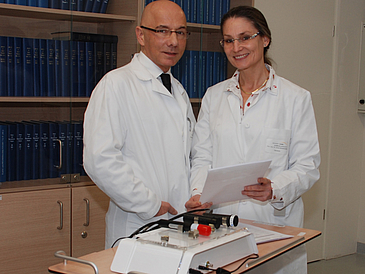The phase started with several successful projects conducted by the University of Bremen in cooperation with the Bremen clinics Gesundheit Nord. An excellent example is the research project on cicatrization carried out by plastic surgeon Professor Ursula Mirastschijski in cooperation between Gesundheit Nord and the University. Professor Mirastschijski from the clinic Bremen Mitte and the Center for Biomolecular Interactions Bremen (CBIB) is testing a substance that reduces cicatrization, or scarring, by slackening the inflammatory reaction of damaged skin. The initial results are so promising that the substance will now be tested in a clinical study to ascertain its efficacy and skin tolerance before entering the next phase to develop a marketable medical product. Volunteer test persons are now being sought.
Research high potential for future marketing
This so-called Phase-1 clinical study is obligatory before medicaments are allowed to be put on the market. For her research, Ursula Mirastschijski uses a substance called lung surfactant, which is extracted from the lung. The idea to use this substance in the treatment of damaged skin led to the award of a coveted European research funding format that will now finance the present phase: The Proof of Concept Grant awarded by the European Research Council (ERC) is one of the highest profile awards. It is only granted when the initial research results are particularly successful and likely to reach market maturity. Mirastschijski was quick to perceive the potential of her wound healing concept and she approached InnoWi, the patent marketing agency of the Bremen Universities, early on. Following exhaustive patent and marketing research, InnoWi registered an international patent on the idea and took over the marketing responsibilities. “The study which is now beginning marks an important step towards turning the idea into a marketable product”, explains InnoWi director, Dr. Lieselotte Riegger. She is very confident that if the results are positive there will be further funding for product development: According to Riegger, “In Germany alone, some 1.5 million people suffer from chronic non-healing wounds”. Professor Mirastschijski confirms the advantages such a product would bring: “It could be used in the healing process of acute as well as for chronic skin wounds and would at the same time reduce cicatrization. I believe it will be a boon especially in the healing of chronic, lasting wounds that until now result in heavy scarring”.
Cooperation between the University and the clinic Bremen-Mitte
This success is important milestone both for the University as well as for the clinic. As a doctor of medicine, Ursula Mirastschijski builds a bridge between basic research at the University of Bremen and clinical application, which usually takes place in university clinics. “Gesundheit Nord is able to strengthen its activities in the area of research”, says Professor Can Cedidi, Director of the Clinic for Plastic, Reconstructive and Aesthetic Surgery at the Bremen Mitte clinic. “The good cooperation with the University means we can keep our finger on the pulse of cutting edge research. At the same time, the clinics develop new questions for research from their daily practice.” This is backed up at the University of Bremen by Professor Sørge Kelm from the Center for Biomolecular Interactions Bremen (CBIB): “The high level of molecular-biological research at our University is enhanced further by the cooperation with Gesundheit Nord”.
This kind of interdisciplinary activity is known as “translational medicine”. This means that the results of basic research are swiftly and efficiently transferred into clinical practice and, in turn, experience and observations in the practice are reflected in the research laboratory. Additional help made-in-Bremen comes from the Competence Center for Clinical Studies Bremen (KKSB), which supports cooperation between the University and Gesundheit Nord by organizing the clinical trials, for instance, as well as collecting and evaluating the test data. Together with InnoWi, which is responsible for arranging comprehensive patent protection and marketing, this reciprocal stakeholder cooperation is developing into a competence area in Bremen that in future is capable of creating further synergies at interfaces between science and clinical application on a high scientific level.
Volunteers sought for clinical trials
Professor Mirastschijski is currently in the process of finding volunteer test persons between the age of 18 and 60 to participate in the Phase 1 trials. Over an eight-day period, these persons will have tiny cuts in their skin observed every two days of the healing process. Anyone interested in helping should please contact Maike Kaluscha from the Competence Center for Clinical Studies Bremen, which handles the recruitment of test persons, makes sure that any data collected is anonymized, and participates in their scientific evaluation: www.kksweb.uni-bremen.de (Phone: +49 421 218-63788, email: kaluschaprotect me ?!uni-bremenprotect me ?!.de)
If you would like to have more information on this topic, feel free to contact:
University of Bremen
Faculty Biology/Chemistry
Center for Biomolecular Interactions
Prof.Dr. med. Dr. phil. Ursula Mirastschijski
Phone: +49 421 218-63224
email: mirastscprotect me ?!uni-bremenprotect me ?!.de

